Performance reviews are a useful tool for managers to evaluate and motivate their employees. Peer reviews have been added to the mix, too, to provide a more holistic assessment.
However, only 14% of employees agree that their performance reviews inspire them to improve.
So, how can we make sure that we give peer reviews that inspire and motivate growth? We dive into all that and more in this article.
What is a peer review?
Peer reviews are part of a 360-degree feedback system where colleagues assess and review each other’s work performance. Instead of relying on traditional top-down assessments from managers, employees gain insights and feedback from different levels and roles, including those working closest to them.
Why are peer reviews important?
Peer reviews aren’t just checkboxes to mark. When done properly and thoughtfully, they actually have a lot to offer. For instance, they:
- Provide broad perspective: Peer reviews introduce multiple viewpoints, presenting a more well-rounded evaluation.
- Promote continuous growth: Constructive feedback from colleagues can identify areas for improvement.
- Strengthen team dynamics: The peer review process encourages open communication, mutual respect, and better collaboration.
- Encourage accountability: Employees often work more diligently and better pull their weight when they know they’ll be peer-reviewed.
- Identify blind spots: Colleagues may be able to observe strengths and weaknesses that are not necessarily obvious to managers or employees themselves.
How to prepare for a peer review
Giving a good peer review is just like doing other work tasks — you need to make sure you understand the assignment and prepare adequately.
Follow these four steps to ace your peer review:
1. Understand the review guidelines
First, you need to understand what you’re reviewing. Are you evaluating your colleague on project outcomes, teamwork, communication skills, or all of the above? This step helps you consider all relevant criteria rather than just saying whatever comes to mind first.
Clarify the expectations and goals of the review process to align your feedback with your company’s goals. For example, if the company’s quarterly goal is to enhance collaboration across departments, you can specifically address how your colleague communicates and contributes to interdepartmental projects.
2. Check for objectivity
Personal feelings and judgments can often influence your review. This is well known — 25% of employees see performance reviews as either somewhat or completely biased. That’s why it’s important to take a step back to ensure your evaluation is fair and impartial.
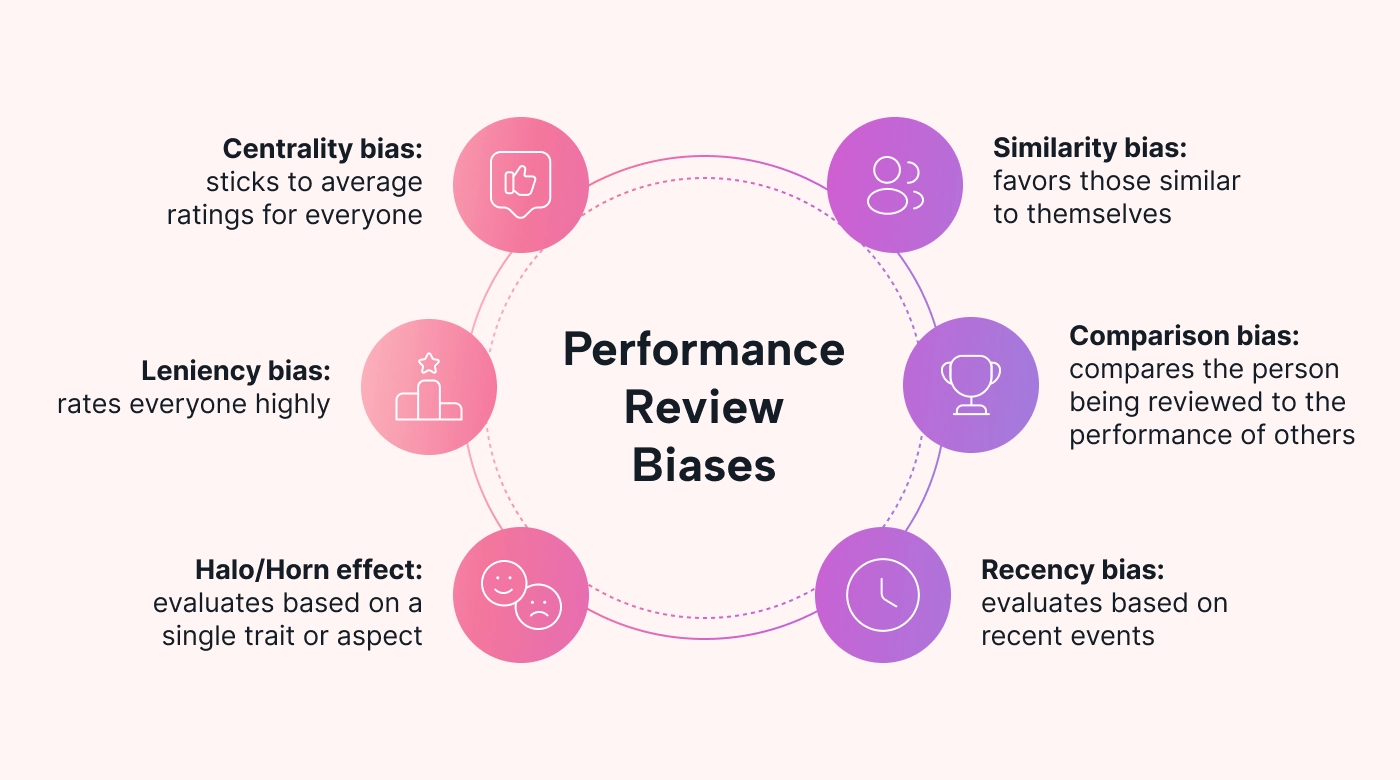 |
Be aware of any biases or preconceived notions, such as favoritism, the halo effect, or the horn effect. Your review should provide effective feedback based on your colleague’s performance and your own observations, not your personal feelings.
3. Gather evidence
To ensure that your peer feedback doesn’t feel vague, support what you say with evidence. Look at how your colleague typically behaves, their work output and communication patterns, and how they handle conflicts.
For instance, if you want to commend them for great teamwork, mention a time when they effectively solved a challenging issue within the team.
4. Practice giving constructive feedback
Negative feedback can feel both uncomfortable for the reviewer and hurtful to the person being reviewed. It’s important to remember that the goal of a peer review is to help your peers grow and improve, not to shoot them down.
Always aim to be constructive and provide helpful insights rather than generic compliments. This can help to boost engagement and foster a positive work culture — 80% of employees who have received meaningful feedback are more engaged regardless of how many days they have worked.
To do this, practice framing negative feedback in a way that encourages your colleague to grow. So, instead of saying, “You’re not good at this,” focus on explaining how they can improve in that specific area.
20 positive peer review examples
While it’s generally easier to give positive feedback to your peers than negative, simply saying, “Good job” or “Well done” isn’t exactly helpful. It’s important to provide specific feedback that highlights particular qualities, contributions, or achievements.
Take a look at our 20 positive peer review examples to see what good feedback looks like.
Overall performance
1. I’ve noticed how you’ve been hitting all your goals lately. It’s awesome to see your hard work and dedication pay off.
2. Since your last review, you’ve improved so much in your overall performance. It’s clear you’ve spent a lot of time and effort on your work this past quarter.
Work quality
3. Your attention to detail is next-level. Every project you deliver is accurate and polished. We haven’t had to worry about correcting errors in our client presentations.
4. No matter the project’s size or complexity, you consistently deliver results that exceed our expectations.
Time management and productivity
5. With the amount of tasks you have on your plate, it’s inspiring to see how you manage everything so efficiently while keeping a cool head.
6. You’re really good at organizing and prioritizing your workload. I don’t think you’ve missed a single deadline.
Leadership skills
7. You lead by example. Instead of just giving orders, you encourage others to take initiative and speak their minds — even if they differ from yours.
8. Under your leadership, our team’s morale and productivity have never been higher. Your effective delegation and encouragement have truly motivated the entire team.
 |
Communication skills
9. I’m genuinely impressed by how you communicate complex ideas in a simple way so that everyone involved understands the assignment.
10. Not only are you great at expressing yourself, but you’re also a fantastic listener. This quality has really improved how our team works together.
Team collaboration
11. You’re someone the team can rely on because you consistently show up, do your best, and support everyone’s efforts.
12. Your positive attitude has a ripple effect on the entire department, inspiring others and contributing to a more collaborative and happy workforce.
Problem-solving skills
13. When making tough decisions, you’re my go-to person because you excel at breaking down hard problems and brainstorming new solutions.
14. Your ability to stay calm and analytical under pressure is remarkable. You can solve even the most challenging issues with a clear mind.
Adaptability
15. Although the team faced many unexpected challenges this year, you were always able to pivot to a new direction and step up to guide your colleagues.
16. You handle transitions with ease. Whether it's adapting to remote work or juggling different team roles, you quickly adjust and deliver outstanding results.
 |
Work ethic
17. You show up early, stay late when necessary, and are always ready to lend a hand to your teammates.
18. Your professionalism shines through with every interaction and task you take on. Everyone who has worked with you marvels at your reliability, respectfulness, and commitment to work.
Self-improvement
19. Over the past year, I’ve seen you continuously take the initiative to attend online workshops and seminars to stay updated with new technology.
20. I love that you’re always asking for peer feedback. It shows your dedication to personal and professional growth — something we can all learn from.
20 constructive peer review examples
Negative feedback doesn’t always have to be harsh. By focusing on specific behaviors or outcomes that can be improved instead of criticizing your colleagues, you can provide peer feedback that is both meaningful and inspiring.
Here are 20 constructive peer review examples to help you out in your next review:
Overall performance
1. Your creativity during campaign brainstorming is incredible. Being even more consistent with the execution of those ideas would help the team achieve its targets more effectively.
2. It’s wonderful how enthusiastic you are about team projects. For us to work better as a team, you can work on organizing and centralizing your files and notes to help prevent missed or duplicated work.
Motion can help your colleagues get organized by keeping all relevant project details and documents in one place so they don’t lose or miss anything.
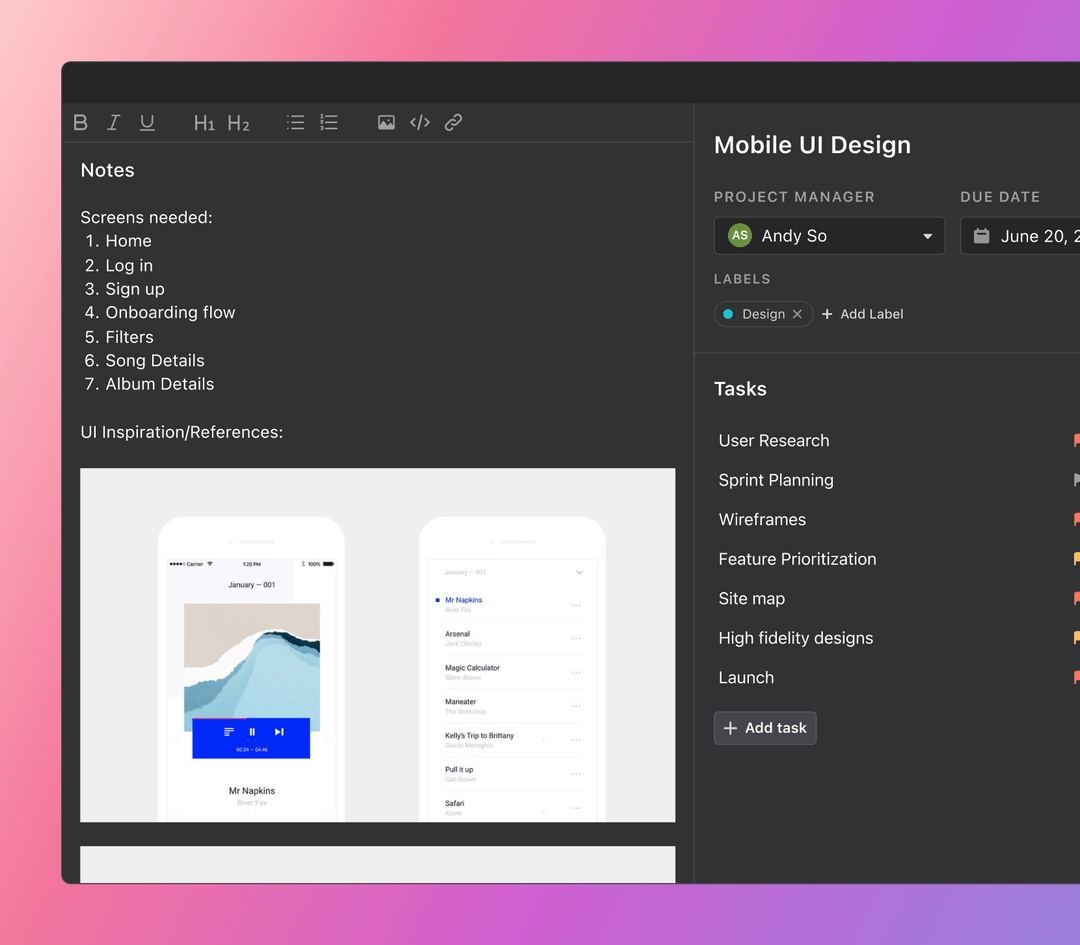 |
Work quality
3. You’re quick to reply to customer requests, but you sometimes miss crucial details, which leads to more confusion. It would be a good idea to create a system that reminds you to double-check these things. I’d be happy to share mine with you.
4. Your reports are comprehensive and informative. But sometimes, they’re so detailed that it’s easy to get lost in them. I suggest that you provide a summary of the key points during discussions.
Time management and productivity
5. I've noticed you sometimes struggle to meet deadlines. This can have a domino effect on the team's workflow. Prioritizing tasks and setting more realistic deadlines could help the team as a whole.
6. While you’re great at meeting urgent deadlines, I would urge you to allocate specific time slots to make steady progress on longer-term projects. Last-minute scrambles can affect your work quality.
Practice time-blocking with Motion. Dedicate part of each day to work on long-term, high-value, or commitment-heavy tasks and projects.
 |
Leadership skills
7. Your project vision is always exciting and ambitious. You’ll be able to better engage and support the team if you check in on everyone’s progress and workload beforehand.
8. It’s admirable that you stand up for what you believe in, and oftentimes, you’re right. That said, practicing your conflict resolution skills will make it easier for you to persuade others.
Communication skills
9. One of your best qualities is your ability to actively listen. But when it comes to client interactions, honing your negotiation skills can help you more effectively advocate for our interests.
10. Your commitment to your projects is commendable. Effectively communicating your concerns and problems before they happen will help us better support and resolve problems.
Communicate with team members through Motion. Our platform allows you to comment directly on project boards, keeping project statuses, changes, and directions crystal clear.
Team collaboration
11. The team values when you take initiative on projects but would appreciate it even more if you more openly shared credit and acknowledged others’ contributions in team assignments.
12. Your ability to coordinate tasks is helpful, and improving your ability to keep track of deadlines would be immensely helpful. That way, you can make sure your pace aligns with the team's needs.
Motion’s team calendar gives your team the visibility it needs to track everyone’s progress and stay aligned. See your teammates’ statuses on individual tasks and how those tasks fit into the broader project timeline.
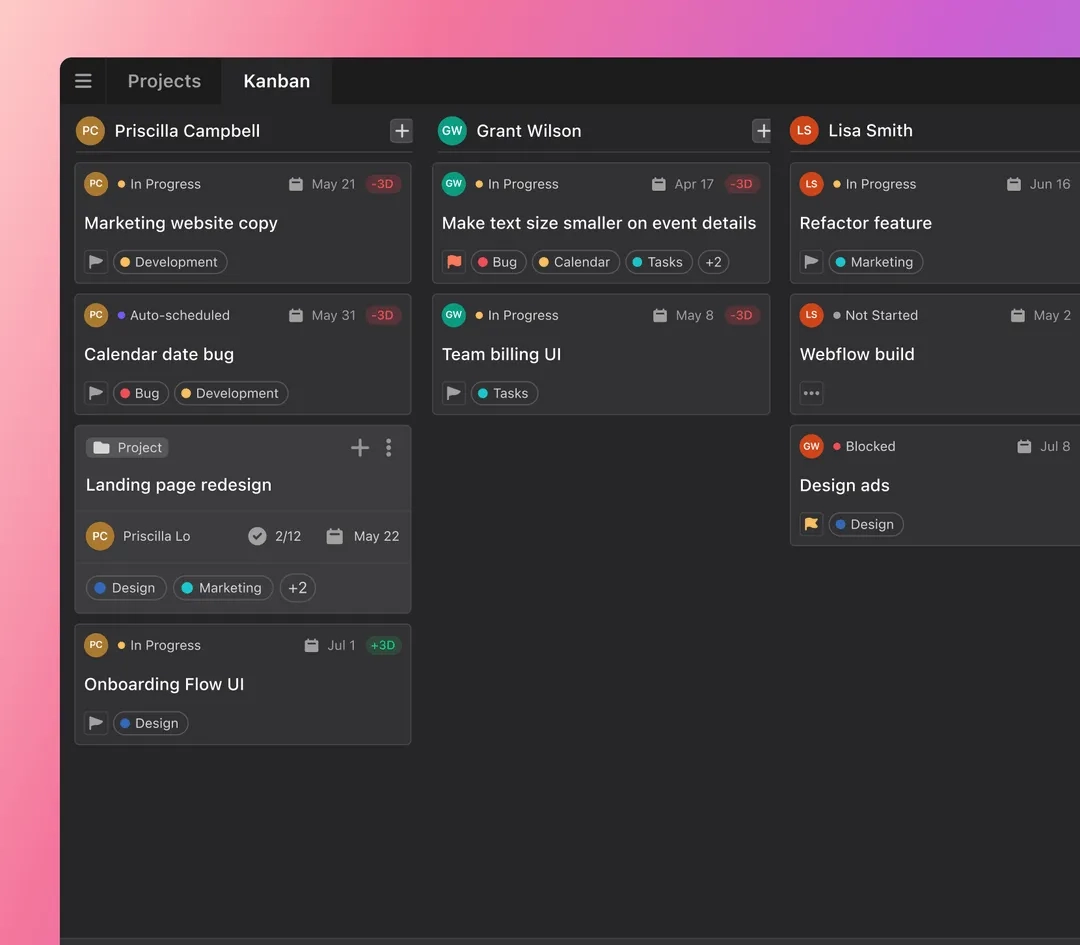 |
Problem-solving skills
13. Your extensive industry knowledge is impressive. If you applied your expertise more to creative problem-solving, you’d be able to come up with even more effective and innovative solutions.
14. Your intuition guides the team in the right direction, but it would help to complement it with decisions that are backed by data. Hard facts also make it easier to convince stakeholders of what needs to be done.
Adaptability
15. Although your current sales tactics work well, being agile and aware of market changes will significantly improve our strategies and performance.
16. Your focus on your current tasks is remarkable. However, learning to accept and bounce back from sudden interruptions can prevent those issues from disrupting your workflow.
Don’t worry when unexpected team meetings or high-priority tasks pop up. Motion reorganizes your daily schedule whenever you’re interrupted. The best part? We don’t send notification after notification — we simply reoptimize your day based on those changes.
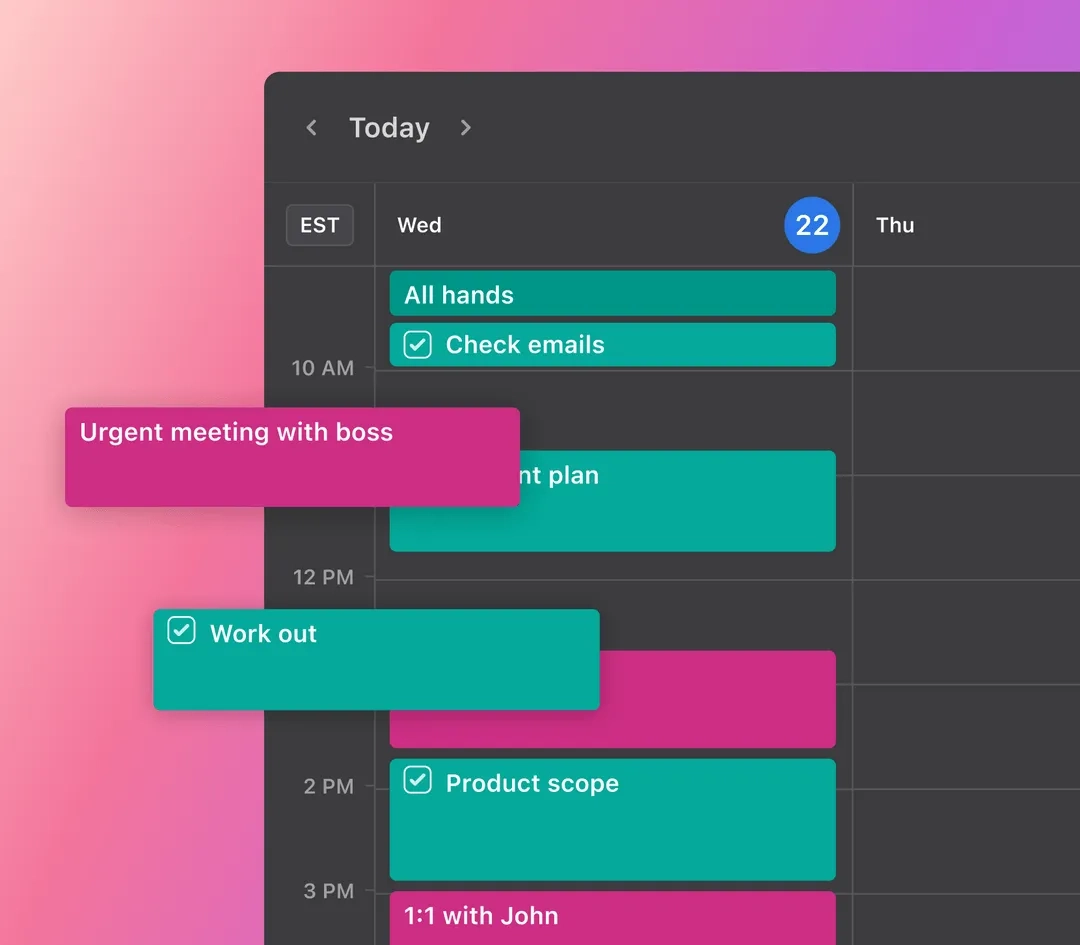 |
Work ethic
17. It’s admirable that you always try to take on new challenges, but learning to delegate when it’s necessary would help the team keep things on track to meet deadlines.
With Motion, your colleagues won’t have to worry about delegating tasks. We automatically assign tasks to teammates based on their schedules and workload.
18. Your dedication to getting the job done is apparent to everyone, but you have room to improve when it comes to managing your energy and focus throughout the day. I would suggest completing your highest-priority work first when you have more energy.
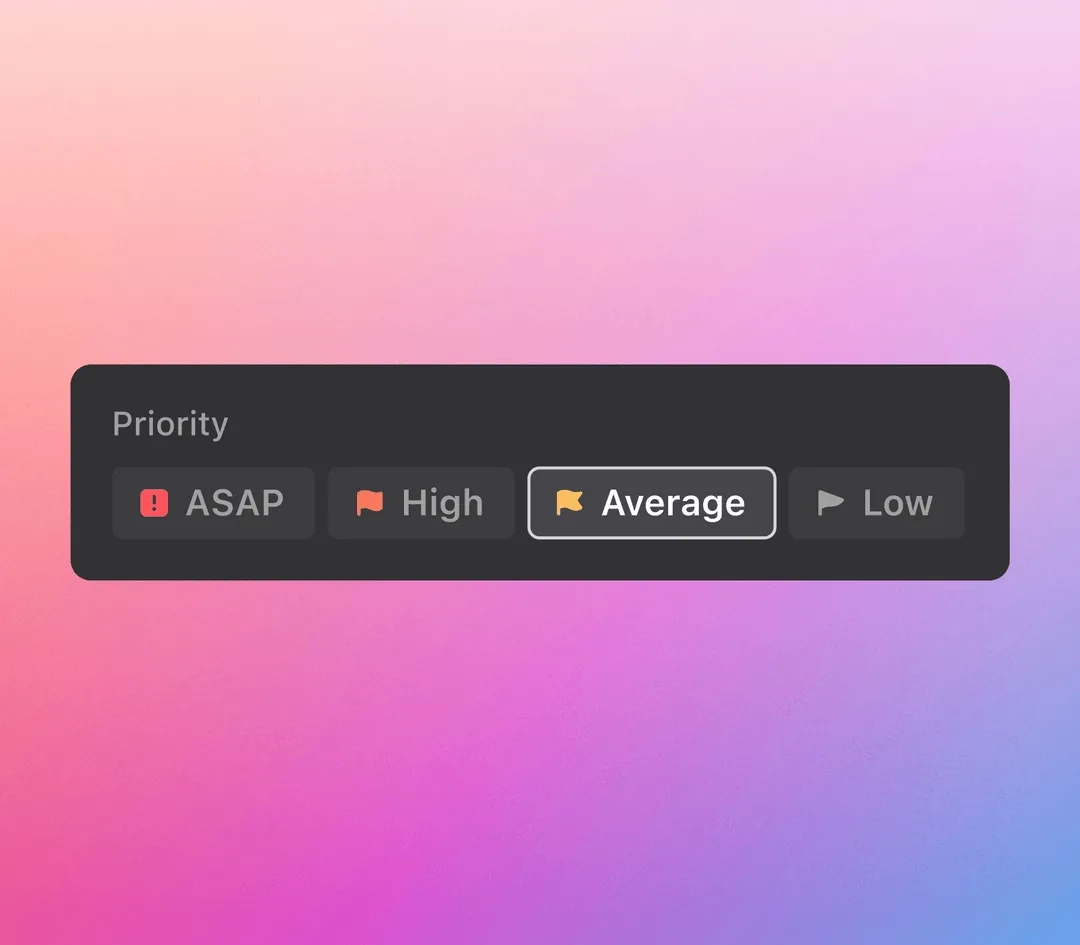 |
Self-improvement
19. You consistently deliver good results with your current responsibilities. Taking on different projects or attending professional development workshops could prevent stagnation and help you grow professionally.
20. Your dedication to your work inspires the whole team. But don’t forget to maintain a healthy work-life balance. Giving yourself time to rest will further improve your productivity and creativity.
Turn your peer reviews into action with the help of Motion
How do you make sure feedback from peer reviews turns into tangible improvements?
Switching to Motion is a great way to start. Use our team calendar to stay aligned, our project manager to track progress and measure goals, and our AI tools to delegate, prioritize, and plan work tasks. Sign up for a free 7-day trial today.

Vicki Chen is a content writer and marketer using proven storytelling methods to create high-quality copy and content for SaaS companies. When she's not writing, she's spending time with Taco, her rescue dog.




